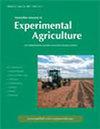Production and persistence of temperate perennial grasses and legumes at five saline sites in southern Australia
引用次数: 26
Abstract
Herbage production and persistence of 24 perennial legumes from 20 species and 19 perennial grasses from 10 species were measured at five sites across southern Australia that differed in annual rainfall and extent of salinity and waterlogging. At Cranbrook, Western Australia, a site with occasional waterlogging and a summer salinity [estimated by electrical conductivity (ECe)] of 6.9 dS/m in the surface 10 cm of soil, strawberry clover (Trifolium fragiferum L.) and Lotus uligonosis Schkuhr produced 2.7 t/ha in the second year and had the highest legume plant frequencies in year 3, while herbage production of L. tenuis Waldst. & Kit. ex Willd. and L. corniculatus L. was not significantly lower. No grasses produced more than 0.3 t/ha in the second year, but tall wheatgrass (Thinopyrum ponticum (Podp.) Z.-W. Liu & R.-C. Wang) was the most persistent. At Girgarre, Victoria, another site with occasional waterlogging and a summer ECe of 8.0 dS/m, phalaris (Phalaris aquatica L.) produced 8.5 t/ha in the second year, while production of tall wheatgrass and perennial ryegrass (Lolium perenne L.) was not significantly lower. Sulla (Hedysarum coronarium L.) was the only legume that produced more than 1 t/ha. Phalaris, tall wheatgrass and sulla had the highest densities in the third year. At Duranillin (Western Australia) and Keith (South Australia), which both experienced extensive winter waterlogging and had summer ECe >30 dS/m, puccinellia (Puccinellia ciliata Bor) and tall wheatgrass were the only grass or legume species that persisted beyond the first summer. Puccinellia was the only species to produce useful quantities of herbage (1.0 t/ha) in year 3 at Duranillin. No perennial grasses or legumes produced more than 0.35 t/ha in either year 2 or year 3 at Tammin, Western Australia, the lowest rainfall site (330 mm mean annual rainfall) with summer ECe of 10.9 dS/m. Genotypic differences within sites were indicated for several species, suggesting opportunities to develop cultivars better adapted to saline soils澳大利亚南部五个盐碱地温带多年生禾本科和豆科植物的生产和持续
在澳大利亚南部5个不同年降雨量和盐渍化程度的地点,测量了20种24种多年生豆科植物和10种19种多年生禾本科植物的牧草产量和持久性。在西澳大利亚的Cranbrook,一个偶尔发生涝涝的地点,土壤表面10 cm的夏季盐度[通过电导率(ECe)估计]为6.9 dS/m,草莓三叶草(Trifolium fragiferum L.)和莲花(lotusuligonosis Schkuhr)第二年产量为2.7 t/ha,豆科植物在第3年的产量最高,而牧草产量为L. tenuis Waldst。和装备。Willd交货。山楂草的含量不显著降低。除高麦草(Thinopyrum ponticum, Podp.)外,没有禾草在第二年产量超过0.3 t/ hm2。z。刘荣成。王)是最执着的。在维多利亚的Girgarre,另一个偶尔涝渍的立地,夏季ECe为8.0 dS/m, phalaris (phalaris aquatica L.)第二年产量为8.5 t/ha,而高小麦草和多年生黑麦草(Lolium perenne L.)的产量并没有显著降低。苏拉(Hedysarum coronarium L.)是唯一产量超过1吨/公顷的豆科植物。第3年密度最高的是Phalaris、高小麦草和sulla。在Duranillin(西澳大利亚)和Keith(南澳大利亚),这两个地区都经历了广泛的冬季涝渍,夏季的ecbb0 - 30 dS/m,而只有puccinellia ciliata Bor和高小麦草在第一个夏天之后仍然存在。在Duranillin第3年,普契利亚(Puccinellia)是唯一产出有用牧草量(1.0 t/ha)的树种。在降雨量最低的西澳大利亚Tammin地区(年平均降雨量330 mm),夏季ECe为10.9 dS/m,在第2年和第3年,多年生禾本科和豆科植物的产量均未超过0.35 t/ha。几个物种在不同地点的基因型差异表明,有机会培育出更适应盐碱地的品种
本文章由计算机程序翻译,如有差异,请以英文原文为准。
求助全文
约1分钟内获得全文
求助全文

 求助内容:
求助内容: 应助结果提醒方式:
应助结果提醒方式:


